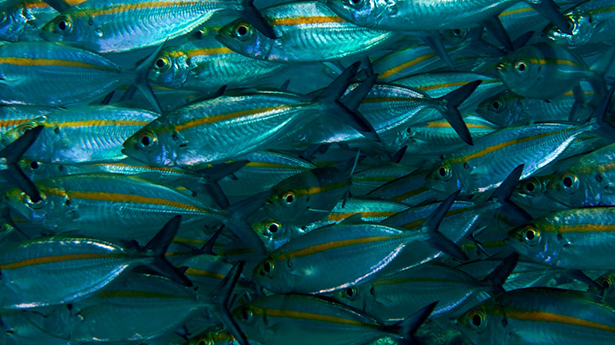“The sea was once filled with fish,” the elderly man told a gathering of indigenous community leaders from across Papua New Guinea’s Oro Bay. He was a grandfather from a local village where people depend on the ocean for their food. In his day, it had been easy. “You could catch very big fish, maybe 20 of them in one hour, and you could cook them on the beach and still have enough to bring home.” Some of the 40 community leaders nodded—the elders, mostly—remembering a time when they could simply walk down to the shoreline to come back with dinner for a week.
Another man stood up. He was middle-aged, and in his time he fished at the same beach on the island. “I still caught 20 fish,” he recalled, “but I’d spend five hours, not one.”
Lastly, a twentysomething young man with a child of his own spoke. “Every day I go fishing,” he said, “and after five hours or so, I catch one fish as big as my hand. Maybe two. I can’t even feed my family with the one or two fish I’m catching in five hours. If I can’t feed my family, what’s my son going to catch? My son will have no food.” He paused and began to cry.
Decades of pollution, destructive fishing techniques, and the effects of deforestation for palm oil plantations are to blame for the dwindling marine resources in the Pacific Islands, where 80 percent of rural people live off the water and land.
“The fourth generation is the one that will have to go without fish,” says Maxine Anjiga, executive director of Centre For Locally Managed Areas, which hosted the intergenerational meeting, and a grant advisor to Global Greengrants Fund’s Pacific Islands Advisory Board. “The communities said, ‘we can still do something together. We can still work together. Maybe it’s not too late.’”
With a $5,000 Greengrant to cover a laptop, digital camera, multimedia materials, a small power generator, and transportation expenses, the newly established Cape Holicote Bay Marine Resource Management Committee travels from community to community leading seminars about protecting the mangroves, sea grasses, and coral reefs that protect fish and provide food for islanders. This is no easy feat considering there are 860 languages spoken in Papua New Guinea alone. About 3,000 indigenous people, half of whom are youth, will eventually participate in the seminars. The group has even involved the government and a climate change officer in its campaign and proposed innovative scientific measures to revive depleted fish populations.
Global Greengrants, Anjiga says, is helping the group spread the word, especially to the youngest generation, that it’s not too late to reverse the trajectory.
“The world out there in the seas is its own system and it can look after us,” she says. “And it’s not just ‘the environment;’ the environment is connected to the people. This is a world of its own, and this world feeds us, so why are we destroying it?”
We are supporting Papua New Guinea’s Cape Holicote Bay Marine Resource Management Committee to raise awareness of five important marine management goals:
- Protect natural resources. A healthy fish population needs a healthy habitat, and that requires restoring and protecting the area’s coral reefs, the sea grass, and the mangroves so fish can lay eggs and flourish in a sheltered environment.
- Eliminate destructive fishing. Careless and harmful fishing techniques, such as poisoning the waters and dynamiting the reefs, can destroy critical natural resources as well as deplete the fish population.
- Prepare for natural disasters. Volcano eruptions, tsunamis, cyclones, and other geological and weather-related crises in the region can wreak havoc on delicate coastal environments. You can’t stop nature, but you can have a plan to mitigate its potential impact on coastal areas, ecosystems, vegetation, and wildlife.
- Reduce land-based pollution. Oil palm harvesting and logging contribute to an accelerating rate of deforestation that ratchets up climate change and trickles down to marine areas with acidification and sedimentation, according to the Pacific Climate Change Science Program.
- Be aware of climate change. Temperatures are increasing and sea levels are rising in the Pacific Islands, says the Pacific Climate Change Science Program. In fact, the Carteret Islanders in Papua New Guinea were the world’s first climate change refugees. Coastal communities whose livelihoods are rooted in the ocean need to plan ahead for the consequences—social upheaval, cultural loss, and shifting livelihoods—of the earth’s changing climates and oceans.
By Julie Dugdale (@julie_dugdale)
Photos from top: Anderson Smith / CC BY, Des Paroz / CC BY NC ND


